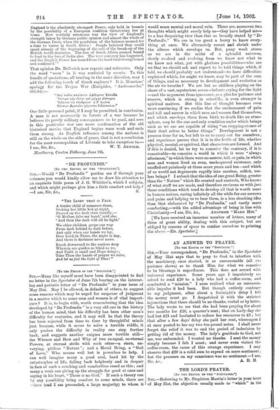['ro THZ EDITOR OF THE "SPECTATOR."] Sin,—Many like myself must
have been disappointed to find no letter in the Spectator of June 7th bearing on the interest- ing and pathetic letter of "De Profundis" in your issue of May 31st. May I be allowed, in default of others, to suggest some reasons which may be urged for suspense of judgment in a matter which to some men and women is of vital import- ance? It is, to begin with, worth remembering that the idea developed by "De Profundis" is a very old one in the history of the human mind, that his difficulty has been other men's difficulty for centuries, and it may well be that the theory has been rejected from time to time by thoughtful minds just because, while it seems to solve a terrible riddle, it only pushes the difficulty in reality one step further back, and suggests another enigma more terrible still— the Whence and How and Why of two co-equal, co-eternal Powers, at eternal strife with each other—a stern, un- varying, pitiless " Nature "; and a Moral Being, a "God of Love," Who means well but is powerless to help. I can well imagine many a good soul, bard hit by the catastrophes of life, falling back helplessly and in despair in face of such a crushing and comfortless creed as this ; and many a weak one giving up the struggle for good at once and saying in his heart, "There is no God." If such a theory can by any possibility bring comfort to some minds, there are ot hers (and I am persuaded, a large majority) to whom it
would mean mental and moral ruin. There are, moreover, two thoughts which might surely help us—they have helped me— to a less despairing view than that so broadly stated by "Do Profundis." We are in too great a hurry to know every- thing at once. We alternately resent and shrink under the silence which envelops us. But, puny weak atoms as we are in the midst of a splendid universe, slowly evolved and evolving from we know not what to we know not what, yet with glorious possibilities—who are we that we should ask and expect to be told things which, if
told, we should probably not understand—to have difficulties explained which, for aught we know, may be part of the sum of things, and as necessary to development and evolution as the air we breathe ? We are but as children playing on the shore of a vast, mysterious ocean—infants crying for the light —and the argument from ignorance, as a plea for patience and reserve, which is strong in scientific, is even stronger in spiritual matters. But this line of thought becomes even more convincing if we realise that the environment of pain and toil and sorrow in which men and women find themselves, and which envelops them from birth to death like an atmo- sphere, may be the one and only condition under which beings such as we are are capable of rising "on stepping-stones of their dead selves to better things." Development is not a process done for us, but left to us to carry out for ourselves ; and experience proves that it is in the battle of life, whether physical, mental, or spiritual, that characters are formed. And if this is denied, let us try to conceive the contrary, if it is conceivable—to conceive a world in which it were "always afternoon," in which there were no sorrow, toil, or pain, in which men and women lived an even, nnchequered existence, only snuffed out painlessly at three score years and ten—and which of us would not degenerate rapidly into careless, selfish, use- less beings? I submit that the idea of one great Being, greater than the "Nature" which He created and controls, Who knows of what stuff we are made, and therefore environs us with just those conditions which tend to develop all that is worth most in human nature, caring infinitely all the while for our sorrows and pains and helping us to bear them, is a less shocking idea than that elaborated by "Do Profundis," and vastly more comforting,—with the added advantage of being in line with [We have received an immense number of letters, many of them of great ability, dealing with this subject, but are obliged by reasons of space to confine ourselves to printing the above.--ED. Spectator.]










































 Previous page
Previous page